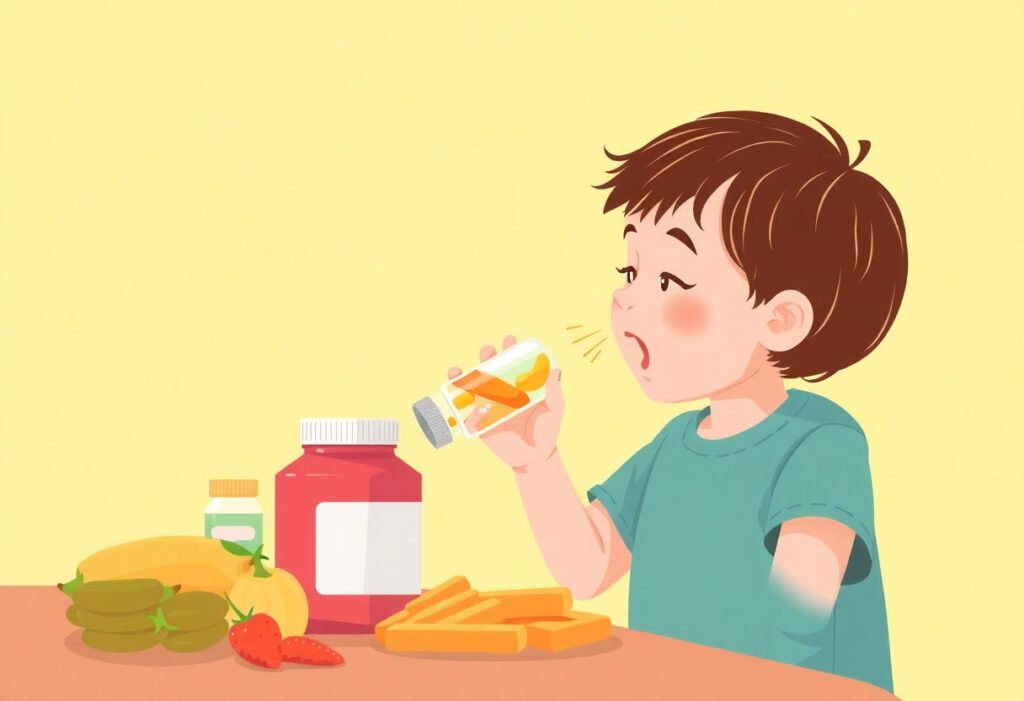Ensuring your child has a healthy appetite is crucial for their overall growth and development. While every child may experience periods of varied hunger, persistent loss of appetite can be concerning. This comprehensive guide explores how specific vitamins can play a pivotal role in increasing appetite for kids. From understanding why appetite matters and identifying reasons for its decline, to discovering top vitamins like Vitamin B Complex, Vitamin D, Zinc, and Iron that can make a difference—we’ll cover it all. Read on to learn how these essential nutrients can support your child’s hunger and vitality.
Key Takeaways
- Vitamins such as B Complex, D, Zinc, and Iron are crucial for boosting your child’s appetite, supporting their overall health and well-being.
- A healthy appetite in children is essential for their growth and development, ensuring they receive necessary nutrients.
- Common causes of appetite loss include nutritional deficiencies, which can often be addressed with the right vitamin supplements.
- It’s important to incorporate vitamins into your child’s diet safely, with attention to potential side effects and consultation with a healthcare professional.
- Selecting the appropriate supplement can help effectively increase your child’s appetite while maintaining their health and safety.
Why Appetite Matters for Kids

A healthy appetite is more than just a child’s desire to eat; it’s a fundamental pillar for their overall development and growth. From babies to teenagers, the foods children consume supply the essential nutrients needed for their bodies to develop properly. A solid appetite ensures that kids are eating enough to support physical activities, cognitive development, and emotional well-being.
When children eat well, they’re more likely to consume a balanced diet rich in essential vitamins and minerals. This balance is crucial for fueling their bodies with the right energy, supporting the immune system, and fostering strong bones and muscles. Without a proper appetite, children might miss out on these vital nutrients, leading to potential growth concerns and a weakened immune response.
Moreover, a healthy appetite often correlates with a child’s emotional and mental state. Regular meal patterns and interest in food can contribute to psychological stability and a sense of security. On the other hand, a lack of appetite can be a sign of underlying issues such as stress, anxiety, or even developmental concerns.
Parents should pay attention to their child’s eating habits and recognize when appetite falls short of healthy norms. This awareness can lead to timely interventions, including dietary adjustments or supplementation with the best vitamins for appetite increase for kids. Encouraging a nurturing mealtime environment can also make a significant difference in reigniting a lagging appetite, ensuring little ones get the most out of their meals for holistic growth and happiness.
Common Causes of Appetite Loss in Kids
A decrease in a child’s appetite can be distressing for parents, but understanding the potential causes can provide reassurance and direction. Illness is a common reason for appetite loss. Whether a minor cold or a more significant infection, during illness, children often eat less. Once recovery begins, appetite typically returns to normal.
Sometimes, appetite loss can be linked to emotional factors. Stress, anxiety, or changes in the family environment can impact a child’s desire to eat. Encouraging open conversations about their feelings can often help in such situations.
Another consideration is dietary habits. If children fill up on snacks or beverages between meals, naturally, their desire for main meals diminishes. Maintaining regular meal and snack routines can help address this issue.
Nutritional deficiencies might also play a role. Lacking essential nutrients, like zinc or iron, can suppress hunger. In these cases, introducing vitamin-rich foods or supplements after consulting a healthcare professional can boost appetite.
Lastly, keep an eye on physical activity levels. Children who are less active may not feel as hungry. Encouraging regular play and exercise can stimulate hunger and contribute to healthier eating habits.
Understanding these factors can help parents take proactive steps in supporting their child’s appetite, ensuring they receive the nutrition essential for their growth and development.
Top Vitamins to Boost Appetite

Vitamin B Complex
The Vitamin B Complex plays a crucial role in increasing appetite among children. Comprising various B vitamins like B1 (thiamine), B2 (riboflavin), B3 (niacin), B6 (pyridoxine), and B12 (cobalamin), this group helps boost metabolism, which is essential for energy production. When your child’s metabolism is functioning optimally, they may experience increased hunger. Another benefit is that these vitamins help in producing neurotransmitters that can enhance mood, potentially leading to a better appetite.
Vitamin D
Vitamin D is often celebrated for its role in supporting bone health, but it also plays a significant part in appetite regulation. This vitamin helps the body manage glucose and insulin levels, potentially influencing hunger and fullness signals. Ensuring your child has enough Vitamin D, either through sunshine, diet, or supplements, can be a valuable step in managing their appetite if it seems suppressed.
Zinc
Zinc is a vital mineral that can directly influence taste and smell, which are critical factors in appetite enhancement. Zinc deficiency is linked with a loss of taste and smell, leading to decreased interest in food. Supplementing zinc in children who may not be getting enough through their diet could help stimulate their appetite by making food more appealing.
Iron
Iron is essential for maintaining healthy energy levels because it aids in the production of hemoglobin, which transports oxygen to the body’s cells. A deficiency in iron can lead to fatigue and decreased appetite. By incorporating iron into your child’s diet, whether through foods like lean meats, beans, and spinach or appropriate supplements, you can help boost their energy and naturally increase their hunger cues.
Incorporating Vitamins into Your Child’s Diet

Introducing vitamins into your child’s diet can be a straightforward and rewarding endeavor with a little creativity and planning. Here are some practical tips to help:
-
Balanced Meals: Start by ensuring your child’s meals are well-balanced, incorporating various food groups to naturally include essential vitamins. For example, include leafy greens, which are rich in Vitamin B and iron, and dairy products for Vitamin D.
-
Fortified Foods: Consider foods that have been fortified with vitamins like Vitamin D and iron. Common options include cereals, milk, and orange juice designed to support daily vitamin intake.
-
Fun and Tasty Options: Kids can be picky eaters, so it’s useful to make vitamin-rich foods appealing. Involve them in the preparation by letting them help with simple tasks. Making a colorful fruit smoothie can offer both Vitamin C and zinc, while being a fun activity.
-
Cooking Together: Engaging kids in cooking can increase their interest in trying new foods. Use this opportunity to introduce vegetables and proteins that are high in essential nutrients.
-
Use Supplements Wisely: While whole foods are the best source, sometimes supplements are necessary. Choose kid-friendly options such as chewable tablets or gummies, but always discuss with a healthcare provider to determine the appropriate dosage and type.
By incorporating these tips, you can naturally and effectively enhance your child’s diet with the necessary vitamins to support their appetite and overall health.
Choosing the Right Supplement
When seeking supplements to increase your child’s appetite, it’s crucial to select the right products tailored to their unique needs. Start by considering age-appropriate formulations. Many manufacturers offer vitamins specifically designed for children, ensuring the correct dosage and nutrient balance. Always look for products labeled for children to avoid overconsumption of any vitamin.
Next, evaluate the ingredient quality. Check for supplements free from artificial colors, flavors, and preservatives. Organic or natural options are preferable as they minimize the risk of unwanted additives. It’s also wise to choose supplements with a good bioavailability—meaning the body can easily absorb and utilize the nutrients.
Consider convenience and taste, especially since children are often picky. Chewable tablets, gummies, or liquid vitamins can be more appealing to younger ones. These formats not only make supplementation easier but also enhance adherence to a regular routine.
Beyond ingredients, consultation with a healthcare professional is essential. A pediatrician can offer personalized guidance, ensuring the chosen supplement aligns with your child’s health profile and dietary needs. They may also recommend blood tests if deficiencies are suspected, guiding exact supplementation.
Additionally, look for third-party certifications, like USP or NSF, which indicate that the product has been tested for quality and potency. Such certifications boost confidence in your choice by assuring that what’s on the label matches what’s in the bottle.
By taking these steps, you can ensure your child receives safe, effective supplements that support a healthy appetite and overall well-being.
Potential Side Effects of Supplements
While vitamins can play a significant role in enhancing your child’s appetite, it’s crucial to be mindful of potential side effects when incorporating supplements into their routine. Supplements can cause mild to severe side effects depending on various factors, including dosage and individual health conditions.
-
Digestive Upset: Some children may experience stomach aches, nausea, or diarrhea when starting new supplements. To minimize this risk, it’s advised to begin with a lower dosage and gradually increase to the recommended amount.
-
Allergic Reactions: Although rare, supplements can trigger allergic reactions, including skin rashes, itching, or breathing difficulties. If you notice any unusual symptoms after your child begins taking a supplement, discontinue use immediately and consult with a healthcare professional.
-
Vitamin Overdose: Overconsumption of vitamins, particularly fat-soluble ones like Vitamin D and certain minerals like Iron and Zinc, can lead to toxicity. Symptoms might include muscle weakness, vomiting, and confusion. It’s essential to adhere strictly to the recommended daily allowances for children.
-
Interactions with Medications: If your child is taking any medication, it’s vital to check for potential interactions with supplements. For example, Zinc can interfere with certain antibiotics, while excessive iron might affect the absorption of other drugs.
Before starting any vitamin regimen, discuss it with your pediatrician to customize an approach that suits your child’s specific needs. This ensures that you maximize the benefits while minimizing any risks associated with supplementation.
Conclusion
In conclusion, while ensuring your child has a healthy appetite can be challenging, the right vitamins can play a pivotal role in boosting it effectively. Essential nutrients like Vitamin B Complex and Zinc not only contribute to improved appetite but also support your child’s overall well-being and development. As parents, incorporating these vitamins thoughtfully into your child’s diet is crucial. Remember to consult with healthcare professionals to tailor a nutrition plan that meets your child’s unique needs. By doing so, you can set your child on the path to robust health and optimal growth.
Frequently Asked Questions
What vitamins can help increase my child’s appetite?
Vitamins that are often recommended to help boost a child’s appetite include Vitamin B Complex, Vitamin D, Zinc, and Iron. These nutrients play roles in metabolism, immune support, and overall growth which can influence hunger.
Are vitamin supplements safe for children?
When used as directed, most vitamin supplements are safe for kids. It’s crucial to choose supplements specifically formulated for children and consult with a pediatrician before starting any new supplement regimen.
Can I use vitamins to treat my child’s appetite loss on my own?
While vitamins can support appetite, they should not replace professional medical advice. Consult a healthcare provider to identify the underlying causes of appetite loss and determine an appropriate treatment plan.
How long does it take for vitamins to affect appetite?
The timeline can vary, but some parents notice changes within a few weeks of consistent use. It’s important to follow the recommended dosage and maintain a balanced diet for the best results.
What are the potential side effects of giving my child vitamin supplements?
Possible side effects can include stomach upset or an allergic reaction, depending on the supplement. Always monitor your child for any unusual symptoms and contact a healthcare professional if concerns arise.


